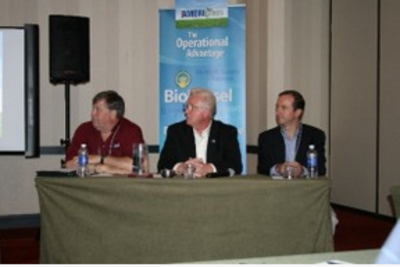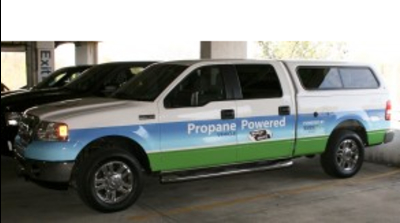Mid-Atlantic Fuel Dealers Get Straight Talk on Energy Options at AMERIgreen Conference

Biodiesel Panel (L to R): Rob Griscom, Ross Enterprises; Joe Biluck, Medford Township Schools; Rick Bologna, Westmore Fuels
Leading energy wholesaler to retail distributors, AMERIgreen, in conjunction with Clean Cities of New Jersey and Pennsylvania, recently hosted “The Fleet Footprint Event: Emissions Requirements and the New Energy Landscape.”
The event, held in Morristown, NJ, presented a candid assessment of all transportation fuels and energy so fuel dealers and their fleet customers can use the information to make smart, cost-effective decisions in to support new emissions goals.
The event covered all alternative fuel technologies taking root in the diesel space.
Attendees learned from and interacted with industry experts and experienced fleet managers. They presented options and key content to incorporate existing equipment to navigate the changes and avoid unexpected costs as they adapt in the face of impending emissions mandates.
Based on feedback, plans are already underway to extend the program to reach additional fleets in the region.
“We hope the event represents a launching point for dealers to continue to grow their relationship with their local market becoming a resource for their customers as they work to comply with emerging emissions standards. The requirements are coming. Positioning dealers as a local resource and engaging with fleets is the best way to remain ahead of the changes to successfully guide customers through the experience with new equipment and energy. This guidance is key to preserving the composition of local commercial relationships,” said Steve McCracken, AMERIgreen CEO of Energy Services.
 The day started with an Alternative Fuels Overview from the Clean Cities Directors of New Jersey and Pennsylvania with an overview of their nationally and state-specific programs, as well as alternative fuels options available for fleets to reduce dependency on foreign oil and lower emissions.
The day started with an Alternative Fuels Overview from the Clean Cities Directors of New Jersey and Pennsylvania with an overview of their nationally and state-specific programs, as well as alternative fuels options available for fleets to reduce dependency on foreign oil and lower emissions.
Steve Howell, NBB Senior Technical Advisor, presented a technical overview of biodiesel. He included a chemical breakdown of the fuel, the history of the ASTM quality specs, importance of food and fuel, and which major vehicle manufacturers have approved their equipment for 20% blends of biodiesel (or B20).
“When you grow a crop of soybeans that soybean is 80% high protein meal, which feeds humans and animals…and it is 20% oil. That oil was an excess commodity,” said Steve Howell. As more of this protein is grown throughout the world, the oil will always come as a result. He added,“The more fuel we make, the cheaper food gets.” This is different than other fuel types such as ethanol and some of the other alternative fuels. Soybeans are not grown specifically for biodiesel – it comes as a result of growing it for feeding animals and humans.
The program also included two panel discussions from fleet users and managers. First, biodiesel industry leaders presented their experiences in using biodiesel within their own businesses. The audience learned about the benefits and challenges they dealt with when introducing biodiesel to their fleets. Rob Griscom, VP of Operations at Ross Enterprises mantra is: “You have to try it. See it for yourself,” when talking to his customers about using biodiesel. He’s such a fan of biodiesel that he uses it for his personal and company vehicles after doing rigorous testing.
biobusThe second panel, propane autogas, CNG and electric vehicle representatives shared their experiences integrating alternative fuels into their own businesses and helping others make the transition.
The event concluded with an Alternative Energy Vehicles Expo. On display were a biodiesel-powered school bus, biodiesel Jeep, propane autogas bi-fuel truck, and electric cars.
A full recap and presentations are here .
Category: Green










